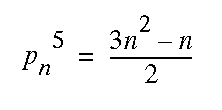Five
Another religious number, also prime.
Closely connected
to Phi (fee).
Pentagonal
numbers: sum of one plus every third number.
1=1
1+4 =5
1+4+7=12
1+4+7+10=22
Every number can be expressed as the sum of 5 pentagonal numbers
or fewer, likely proved by Euler.
The theory of partitions concerns how many ways a number can be
partitioned into the sum of its parts.
For example, 4 can be partitioned in 5 distinct ways:
- 4, 3 +
1, 2 + 2, 2 +
1 + 1, 1 + 1 + 1 + 1.
Euler's partition function p(n)

These are the same numbers that come out of the formula for the
pentagonal numbers alternating between positive and negative n.

In other words: 
While p(n) is generated by 1 over that. (coefficients of the generating
power series are the values of p(n))
p(n) for n=1, 2, ..., are 1, 2, 3, 5, 7, 11, 15, 22, 30
Which is actually quite an amazing phenotype of the number 5.
Back Next


